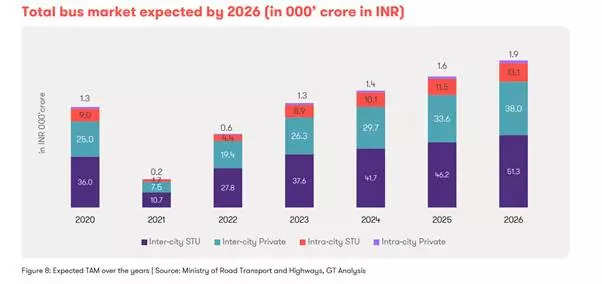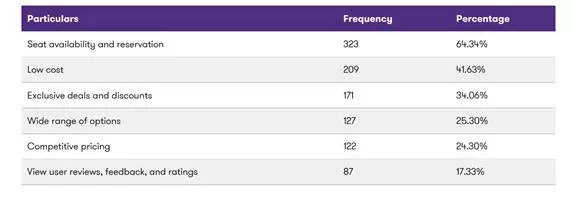
The Indian bus industry is on track to achieve a value of INR 104,000 crores by 2026, showcasing a robust compound annual growth rate (CAGR) of 6.64 percent. These insights are unveiled in the report titled “Traveltech 2.0: The Next Phase of Digitally Empowering the Indian Traveller,” jointly published by the Internet and Mobile Association of India (IAMAI) and Grant Thornton Bharat. This report was launched during the India Digital Summit (IDS) 2024 held in Mumbai.
The report highlights that surface transportation services, including bus and rail travel, offer significant potential for online travel agency (OTA) service providers by delivering value-added services beyond basic online ticketing.
While online ticketing among bus travellers is witnessing a surge, especially in the AC bus segment, intra-city bus travel remains primarily offline-based, presenting substantial opportunities for private sector involvement.
The report also underscores the growing trend of value-added services in intra-city bus travel, such as live bus tracking and digital ticketing, aimed at enhancing the passenger experience.
Despite the predominance of offline ticketing habits, there is a growing interest among users for online services, particularly if they offer features like seat availability details, reservation options, cost-effectiveness, discounts, and diverse price ranges.
In the railway sector, the report reveals that while reserved passengers contribute significantly to revenue, unreserved passengers account for a sizable portion of the total passenger count. This dichotomy presents an opportunity for collaboration between the Centre for Railway Information Systems (CRIS) and private OTAs to expand digital ticketing services and enhance user convenience.
Dhruv Chopra, Co-founder and CMO of Chalo, expressed optimism about the report’s impact on improving city bus travel experiences, emphasising the role of technology in driving positive policy changes.

Commenting on the report’s launch, Aloke Bajpai, MD & Group CEO, ixigo, highlighted the transformative potential of technology in ground transport, particularly with the increasing adoption of OTA-driven tech upgrades.
“Railways and buses are revolutionising the ground transport segment in India. With infrastructure development, increased internet penetration, modernisation and improvement in service quality with OTA-driven tech upgrades, this segment is poised for further growth. By leveraging technology, OTAs are empowering travelers to make smarter travel decisions, and are playing a leading role in driving online adoption in the ground travel sector,” he said.
Prakash Sangam, CEO, Redbus, highlighted the importance of addressing tax disparities in e-commerce transactions to promote online adoption in ground travel. “It is important to remove tax disparities between e-commerce operators and e-commerce suppliers in the domestic market. Currently, a customer pays a 5 per cent GST charge when booking a non-AC bus through an e-commerce platform. This charge is zero for a direct booking from a bus operator, irrespective of whether it is done in online or offline mode,” he said.
Vikash Jalan, Chief Business Officer of PayTM Travel, talked about the collaborative efforts needed to bridge the digital divide and fully leverage travel technology’s potential.
The IAMAI, established in 2004, advocates for the digital industry’s progress through initiatives in public policy advocacy, business conferences, research, startup promotion, and consumer trust and safety.
Grant Thornton Bharat, a member of Grant Thornton International, is a leading professional services firm in India, offering a range of assurance, consulting, tax, risk, and digital transformation services across various industries.




